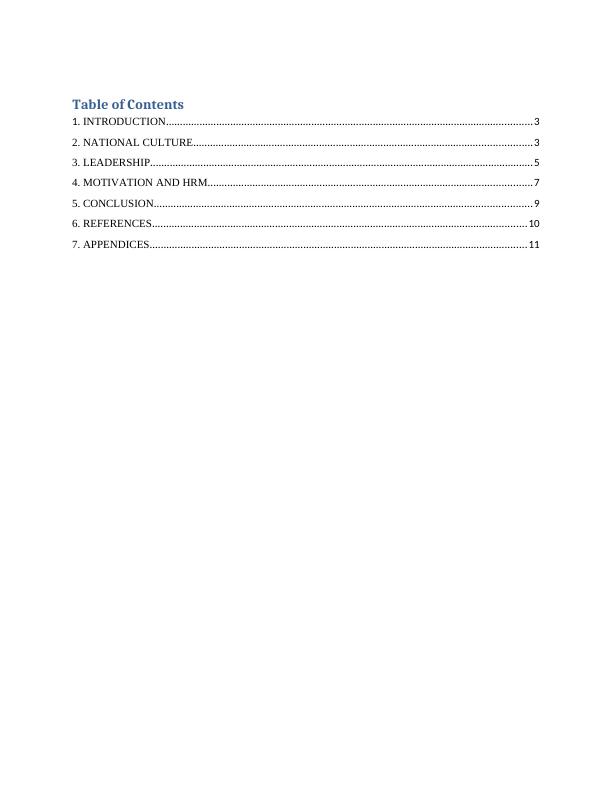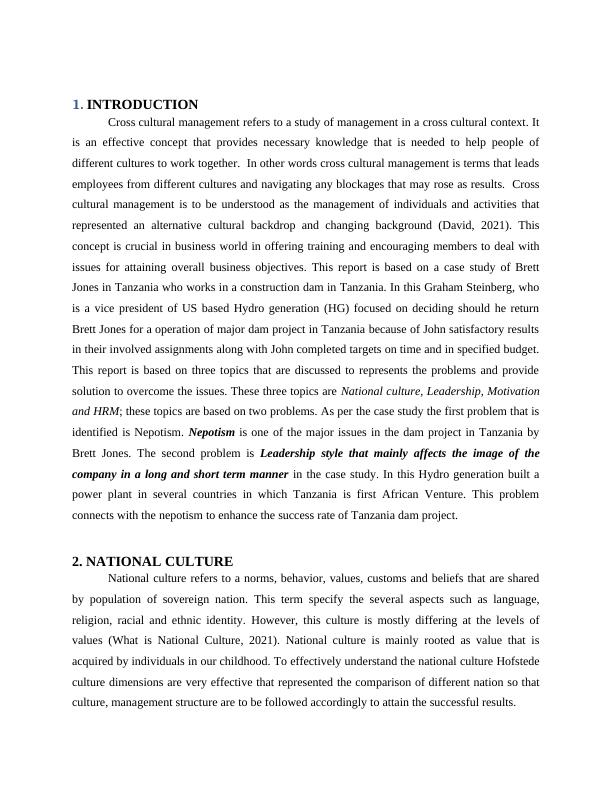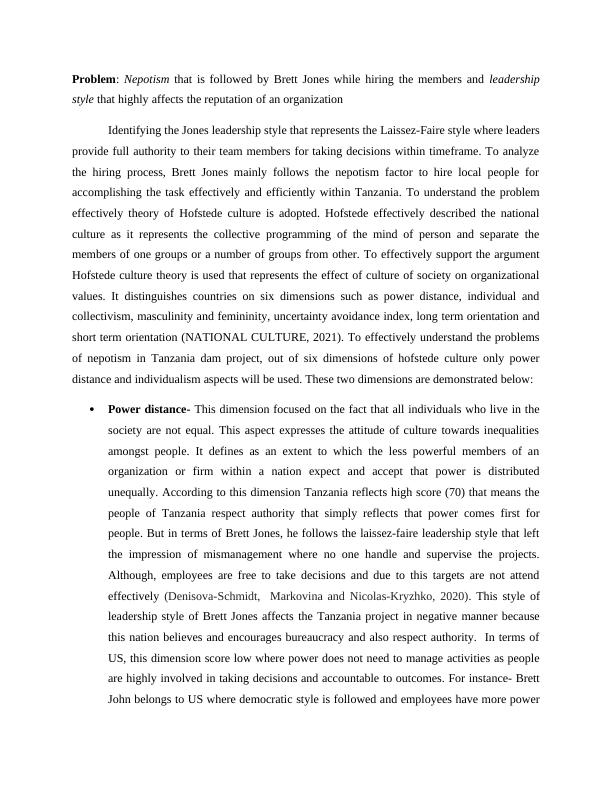Cross Cultural Management: National Culture, Leadership, Motivation and HRM
Added on 2022-12-07
13 Pages3149 Words216 Views
CROSS CULTURAL
MANAGEMENT
MANAGEMENT

Table of Contents
1. INTRODUCTION...................................................................................................................................3
2. NATIONAL CULTURE.........................................................................................................................3
3. LEADERSHIP.........................................................................................................................................5
4. MOTIVATION AND HRM....................................................................................................................7
5. CONCLUSION.......................................................................................................................................9
6. REFERENCES......................................................................................................................................10
7. APPENDICES.......................................................................................................................................11
1. INTRODUCTION...................................................................................................................................3
2. NATIONAL CULTURE.........................................................................................................................3
3. LEADERSHIP.........................................................................................................................................5
4. MOTIVATION AND HRM....................................................................................................................7
5. CONCLUSION.......................................................................................................................................9
6. REFERENCES......................................................................................................................................10
7. APPENDICES.......................................................................................................................................11

1. INTRODUCTION
Cross cultural management refers to a study of management in a cross cultural context. It
is an effective concept that provides necessary knowledge that is needed to help people of
different cultures to work together. In other words cross cultural management is terms that leads
employees from different cultures and navigating any blockages that may rose as results. Cross
cultural management is to be understood as the management of individuals and activities that
represented an alternative cultural backdrop and changing background (David, 2021). This
concept is crucial in business world in offering training and encouraging members to deal with
issues for attaining overall business objectives. This report is based on a case study of Brett
Jones in Tanzania who works in a construction dam in Tanzania. In this Graham Steinberg, who
is a vice president of US based Hydro generation (HG) focused on deciding should he return
Brett Jones for a operation of major dam project in Tanzania because of John satisfactory results
in their involved assignments along with John completed targets on time and in specified budget.
This report is based on three topics that are discussed to represents the problems and provide
solution to overcome the issues. These three topics are National culture, Leadership, Motivation
and HRM; these topics are based on two problems. As per the case study the first problem that is
identified is Nepotism. Nepotism is one of the major issues in the dam project in Tanzania by
Brett Jones. The second problem is Leadership style that mainly affects the image of the
company in a long and short term manner in the case study. In this Hydro generation built a
power plant in several countries in which Tanzania is first African Venture. This problem
connects with the nepotism to enhance the success rate of Tanzania dam project.
2. NATIONAL CULTURE
National culture refers to a norms, behavior, values, customs and beliefs that are shared
by population of sovereign nation. This term specify the several aspects such as language,
religion, racial and ethnic identity. However, this culture is mostly differing at the levels of
values (What is National Culture, 2021). National culture is mainly rooted as value that is
acquired by individuals in our childhood. To effectively understand the national culture Hofstede
culture dimensions are very effective that represented the comparison of different nation so that
culture, management structure are to be followed accordingly to attain the successful results.
Cross cultural management refers to a study of management in a cross cultural context. It
is an effective concept that provides necessary knowledge that is needed to help people of
different cultures to work together. In other words cross cultural management is terms that leads
employees from different cultures and navigating any blockages that may rose as results. Cross
cultural management is to be understood as the management of individuals and activities that
represented an alternative cultural backdrop and changing background (David, 2021). This
concept is crucial in business world in offering training and encouraging members to deal with
issues for attaining overall business objectives. This report is based on a case study of Brett
Jones in Tanzania who works in a construction dam in Tanzania. In this Graham Steinberg, who
is a vice president of US based Hydro generation (HG) focused on deciding should he return
Brett Jones for a operation of major dam project in Tanzania because of John satisfactory results
in their involved assignments along with John completed targets on time and in specified budget.
This report is based on three topics that are discussed to represents the problems and provide
solution to overcome the issues. These three topics are National culture, Leadership, Motivation
and HRM; these topics are based on two problems. As per the case study the first problem that is
identified is Nepotism. Nepotism is one of the major issues in the dam project in Tanzania by
Brett Jones. The second problem is Leadership style that mainly affects the image of the
company in a long and short term manner in the case study. In this Hydro generation built a
power plant in several countries in which Tanzania is first African Venture. This problem
connects with the nepotism to enhance the success rate of Tanzania dam project.
2. NATIONAL CULTURE
National culture refers to a norms, behavior, values, customs and beliefs that are shared
by population of sovereign nation. This term specify the several aspects such as language,
religion, racial and ethnic identity. However, this culture is mostly differing at the levels of
values (What is National Culture, 2021). National culture is mainly rooted as value that is
acquired by individuals in our childhood. To effectively understand the national culture Hofstede
culture dimensions are very effective that represented the comparison of different nation so that
culture, management structure are to be followed accordingly to attain the successful results.

Problem: Nepotism that is followed by Brett Jones while hiring the members and leadership
style that highly affects the reputation of an organization
Identifying the Jones leadership style that represents the Laissez-Faire style where leaders
provide full authority to their team members for taking decisions within timeframe. To analyze
the hiring process, Brett Jones mainly follows the nepotism factor to hire local people for
accomplishing the task effectively and efficiently within Tanzania. To understand the problem
effectively theory of Hofstede culture is adopted. Hofstede effectively described the national
culture as it represents the collective programming of the mind of person and separate the
members of one groups or a number of groups from other. To effectively support the argument
Hofstede culture theory is used that represents the effect of culture of society on organizational
values. It distinguishes countries on six dimensions such as power distance, individual and
collectivism, masculinity and femininity, uncertainty avoidance index, long term orientation and
short term orientation (NATIONAL CULTURE, 2021). To effectively understand the problems
of nepotism in Tanzania dam project, out of six dimensions of hofstede culture only power
distance and individualism aspects will be used. These two dimensions are demonstrated below:
Power distance- This dimension focused on the fact that all individuals who live in the
society are not equal. This aspect expresses the attitude of culture towards inequalities
amongst people. It defines as an extent to which the less powerful members of an
organization or firm within a nation expect and accept that power is distributed
unequally. According to this dimension Tanzania reflects high score (70) that means the
people of Tanzania respect authority that simply reflects that power comes first for
people. But in terms of Brett Jones, he follows the laissez-faire leadership style that left
the impression of mismanagement where no one handle and supervise the projects.
Although, employees are free to take decisions and due to this targets are not attend
effectively (Denisova-Schmidt, Markovina and Nicolas-Kryzhko, 2020). This style of
leadership style of Brett Jones affects the Tanzania project in negative manner because
this nation believes and encourages bureaucracy and also respect authority. In terms of
US, this dimension score low where power does not need to manage activities as people
are highly involved in taking decisions and accountable to outcomes. For instance- Brett
John belongs to US where democratic style is followed and employees have more power
style that highly affects the reputation of an organization
Identifying the Jones leadership style that represents the Laissez-Faire style where leaders
provide full authority to their team members for taking decisions within timeframe. To analyze
the hiring process, Brett Jones mainly follows the nepotism factor to hire local people for
accomplishing the task effectively and efficiently within Tanzania. To understand the problem
effectively theory of Hofstede culture is adopted. Hofstede effectively described the national
culture as it represents the collective programming of the mind of person and separate the
members of one groups or a number of groups from other. To effectively support the argument
Hofstede culture theory is used that represents the effect of culture of society on organizational
values. It distinguishes countries on six dimensions such as power distance, individual and
collectivism, masculinity and femininity, uncertainty avoidance index, long term orientation and
short term orientation (NATIONAL CULTURE, 2021). To effectively understand the problems
of nepotism in Tanzania dam project, out of six dimensions of hofstede culture only power
distance and individualism aspects will be used. These two dimensions are demonstrated below:
Power distance- This dimension focused on the fact that all individuals who live in the
society are not equal. This aspect expresses the attitude of culture towards inequalities
amongst people. It defines as an extent to which the less powerful members of an
organization or firm within a nation expect and accept that power is distributed
unequally. According to this dimension Tanzania reflects high score (70) that means the
people of Tanzania respect authority that simply reflects that power comes first for
people. But in terms of Brett Jones, he follows the laissez-faire leadership style that left
the impression of mismanagement where no one handle and supervise the projects.
Although, employees are free to take decisions and due to this targets are not attend
effectively (Denisova-Schmidt, Markovina and Nicolas-Kryzhko, 2020). This style of
leadership style of Brett Jones affects the Tanzania project in negative manner because
this nation believes and encourages bureaucracy and also respect authority. In terms of
US, this dimension score low where power does not need to manage activities as people
are highly involved in taking decisions and accountable to outcomes. For instance- Brett
John belongs to US where democratic style is followed and employees have more power

End of preview
Want to access all the pages? Upload your documents or become a member.
Related Documents
Cross Cultural Management: National Culture, Leadership, Motivation and HRMlg...
|11
|3345
|270
CROSS CULTURE MANAGEMENTlg...
|11
|3144
|4
Cross Culture Management: Organizational Culture, Leadership, Ethics and CSRlg...
|10
|3116
|1
Cross Cultural Management: National Culture, Leadership, and Motivationlg...
|9
|2862
|309
Cross Cultural Management Assignment Sample PDFlg...
|7
|1730
|236
Nepotism in the Organizational Structurelg...
|10
|1948
|212
